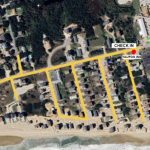In a development that has raised concern with local families, Little Sprouts Daycare — the only licensed year-round day care facility on Hatteras Island — will be shutting its doors at the end of 2025. The decision, which was tied to persistent staffing shortages, leaves parents of infants, toddlers, and preschoolers scrambling to find alternatives, and few exist on Hatteras Island.
In response, three local mothers — Erin Trant, Whitney Dempsey, and Kelly Aiken — have banded together, taking on the uncertain task of pressing local government and nonprofit partners for solutions. Their message is clear: a community cannot function without childcare options.
In mid-July, the parents who rely on Little Sprouts received a letter notifying them of the impending closure, citing ongoing staffing issues. The center currently holds a license for 30 children but is no longer accepting additions to its waitlist.
“This is no fault of their own. We completely understand, but we also understand the severity of the need for our community,” said Trant. “Long-term effects for both our economy and our children entering school without any foundation are evident… A community can’t function without a childcare facility.”
With this in mind, the parents are pushing ahead to find viable solutions, in whatever form they take.
Over the past few weeks, Trant, Dempsey, and Aiken — each juggling careers and motherhood — have held discussions with a host of stakeholders: county officials, school board leadership, and nonprofit child services organizations. Key among these is Children & Youth Partnership for Dare County (CYP), whose director, Sara Sampson, has been cited repeatedly by Trant as a guiding hand in mapping next steps.
“Dare County is going to assist us with whatever resources they are able to,” said Trant. “They can’t fund a daycare facility, but as far as assisting us with moving forward and getting set up, they referred us to the Children’s Partnership director, who is helping us figure out the best route to move forward. County Commissioner Mary Ellon Balance also went to the commissioners and kind of rallied the troops, although it didn’t take much when there may be no facilities for childcare.”
In one recent meeting, attendees reportedly included representatives from Dare County Health & Human Services, CYP, the parents themselves, and local government officials (such as Sheila Davies and Bobby Outten). Through those conversations, the mothers say the county has made clear it is willing to provide auxiliary support, such as logistical assistance and coordinating partnerships.
Given governmental constraints, Trant, Dempsey, and Aiken are charting a likely path forward via a nonprofit childcare model. They are already doing the legwork: drafting a business plan, researching these various models (like cooperative care, shared-space models, flexible or modular pods), and exploring grant and fundraising options.
“We have discussed multiple different options. There are a lot of childcare facility models, so it’s looking like it may be a nonprofit with a community-led board. And there are childcare cooperatives, flex models, and shared-space models,” said Trant. “Running a business, especially when it’s childcare, it’s a delicate balance between how much you can charge families and how much it costs the business to operate.”
They emphasize that while the specific solution — whether a full-scale daycare, cooperative, or hybrid model — is undecided, the urgency is clear. Among their priorities are securing a suitable facility, obtaining licensing, ensuring sustainability of staffing and operations, and building community support.
“Our main goal right now is to just get the word out that our community is about to not have a childcare facility, and we need to do something about it, as parents and community members,” said Trant. “Although I am sure we’ll have additional needs, like writing grant applications or fundraising, in the future.”
Facing a state-level childcare problem
What’s happening on Hatteras Island reflects a broader trend across North Carolina. After the expiration of many pandemic-era stabilization grants, licensed childcare programs have been shuttering at an accelerating pace.
According to recent data:
- The number of licensed family childcare homes (FCCHs) in the state has fallen 22 percent since before the pandemic, and dropped another 3 percent in the most recent quarter.
- In a recent report, the NC Task Force on Child Care & Early Education estimates the average annual cost of infant care in North Carolina is $11,720 — or around 57 percent more than public in-state college tuition. Managing care for two children averages $19,464 — 25 percent more than the average rent in the state.
- The cost of the childcare crisis to North Carolina’s economy is also hefty. Lost productivity, workforce withdrawals, and turnover factors amount to approximately $5.65 billion annually, with an estimated $1.36 billion in lost tax revenues.
- The state Task Force, which most recently convened in 2025, has recommended a set of proposals: establishing a statewide subsidy reimbursement floor, linking compensation supports for early care professionals, partnering with educational institutions, and even the creation of a childcare endowment.
In short, the waves of closures across North Carolina place greater stress on rural and remote communities like Hatteras Island, where alternatives are few, distances are long, and funding opportunities are harder to access.
Erin Trant has already secured a speaking slot at an upcoming NC Childcare Task Force panel in Raleigh, where she hopes to raise awareness about the existential pressures small communities face.
However, ever since she heard the news that the island’s only childcare facility will be closing at the end of the year, her main focus is on Hatteras Island.
“We’re at such an early starting point and there’s a lot of different things we’re diving into,” she said. “And we may be selfish in wanting Hatteras to be addressed first. But we need reliable childcare so that families can continue to live, work, and thrive here.… we risk losing local residents because of the lack of childcare, and in turn, our local economy [will] suffer if we don’t find a solution, and soon.”
The post Upcoming daycare facility closure leaves Hatteras Island facing a childcare void appeared first on Island Free Press.

 Add to favorites
Add to favoritesCredit: Original content published here.




